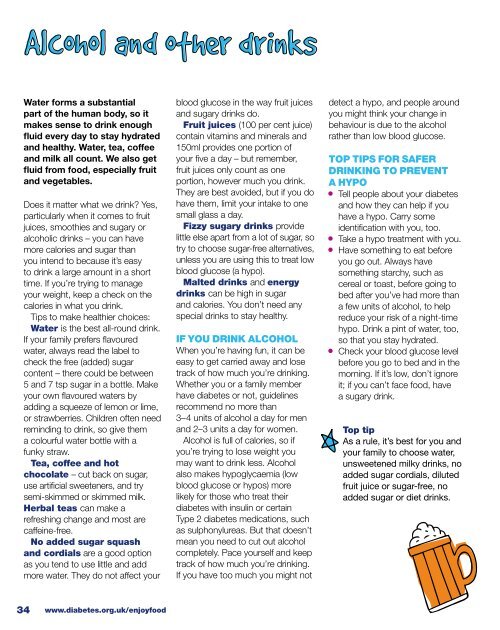Enjoy food
9f7d301hoGi
9f7d301hoGi
You also want an ePaper? Increase the reach of your titles
YUMPU automatically turns print PDFs into web optimized ePapers that Google loves.
Alcohol and other drinks<br />
Water forms a substantial<br />
part of the human body, so it<br />
makes sense to drink enough<br />
fluid every day to stay hydrated<br />
and healthy. Water, tea, coffee<br />
and milk all count. We also get<br />
fluid from <strong>food</strong>, especially fruit<br />
and vegetables.<br />
Does it matter what we drink? Yes,<br />
particularly when it comes to fruit<br />
juices, smoothies and sugary or<br />
alcoholic drinks – you can have<br />
more calories and sugar than<br />
you intend to because it’s easy<br />
to drink a large amount in a short<br />
time. If you’re trying to manage<br />
your weight, keep a check on the<br />
calories in what you drink.<br />
Tips to make healthier choices:<br />
Water is the best all-round drink.<br />
If your family prefers flavoured<br />
water, always read the label to<br />
check the free (added) sugar<br />
content – there could be between<br />
5 and 7 tsp sugar in a bottle. Make<br />
your own flavoured waters by<br />
adding a squeeze of lemon or lime,<br />
or strawberries. Children often need<br />
reminding to drink, so give them<br />
a colourful water bottle with a<br />
funky straw.<br />
Tea, coffee and hot<br />
chocolate – cut back on sugar,<br />
use artificial sweeteners, and try<br />
semi-skimmed or skimmed milk.<br />
Herbal teas can make a<br />
refreshing change and most are<br />
caffeine-free.<br />
No added sugar squash<br />
and cordials are a good option<br />
as you tend to use little and add<br />
more water. They do not affect your<br />
blood glucose in the way fruit juices<br />
and sugary drinks do.<br />
Fruit juices (100 per cent juice)<br />
contain vitamins and minerals and<br />
150ml provides one portion of<br />
your five a day – but remember,<br />
fruit juices only count as one<br />
portion, however much you drink.<br />
They are best avoided, but if you do<br />
have them, limit your intake to one<br />
small glass a day.<br />
Fizzy sugary drinks provide<br />
little else apart from a lot of sugar, so<br />
try to choose sugar-free alternatives,<br />
unless you are using this to treat low<br />
blood glucose (a hypo).<br />
Malted drinks and energy<br />
drinks can be high in sugar<br />
and calories. You don’t need any<br />
special drinks to stay healthy.<br />
IF YOU DRINK ALCOHOL<br />
When you’re having fun, it can be<br />
easy to get carried away and lose<br />
track of how much you’re drinking.<br />
Whether you or a family member<br />
have diabetes or not, guidelines<br />
recommend no more than<br />
3–4 units of alcohol a day for men<br />
and 2–3 units a day for women.<br />
Alcohol is full of calories, so if<br />
you’re trying to lose weight you<br />
may want to drink less. Alcohol<br />
also makes hypoglycaemia (low<br />
blood glucose or hypos) more<br />
likely for those who treat their<br />
diabetes with insulin or certain<br />
Type 2 diabetes medications, such<br />
as sulphonylureas. But that doesn’t<br />
mean you need to cut out alcohol<br />
completely. Pace yourself and keep<br />
track of how much you’re drinking.<br />
If you have too much you might not<br />
detect a hypo, and people around<br />
you might think your change in<br />
behaviour is due to the alcohol<br />
rather than low blood glucose.<br />
TOP TIPS FOR SAFER<br />
DRINKING TO PREVENT<br />
A HYPO<br />
• Tell people about your diabetes<br />
and how they can help if you<br />
have a hypo. Carry some<br />
identification with you, too.<br />
• Take a hypo treatment with you.<br />
• Have something to eat before<br />
you go out. Always have<br />
something starchy, such as<br />
cereal or toast, before going to<br />
bed after you’ve had more than<br />
a few units of alcohol, to help<br />
reduce your risk of a night-time<br />
hypo. Drink a pint of water, too,<br />
so that you stay hydrated.<br />
• Check your blood glucose level<br />
before you go to bed and in the<br />
morning. If it’s low, don’t ignore<br />
it; if you can’t face <strong>food</strong>, have<br />
a sugary drink.<br />
Top tip<br />
As a rule, it’s best for you and<br />
your family to choose water,<br />
unsweetened milky drinks, no<br />
added sugar cordials, diluted<br />
fruit juice or sugar-free, no<br />
added sugar or diet drinks.<br />
34<br />
www.diabetes.org.uk/enjoy<strong>food</strong>


